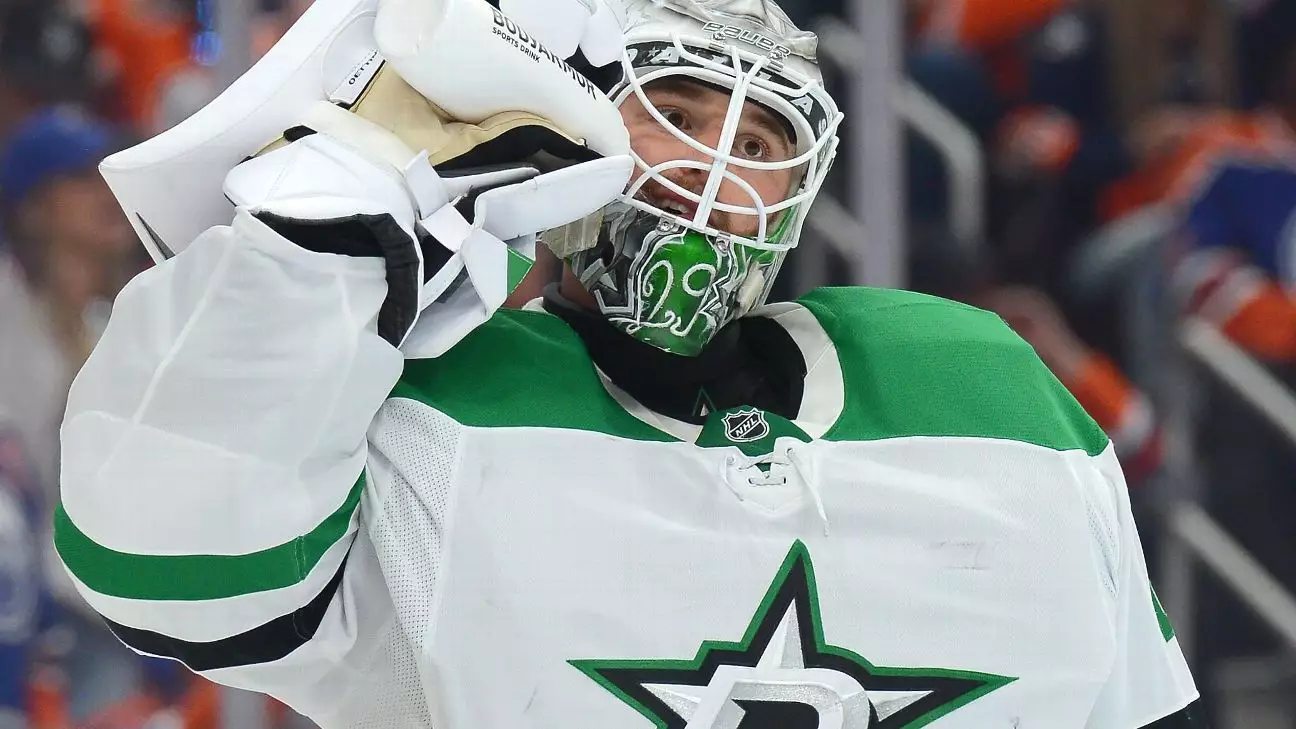The world of professional sports is often a realm of unexpected twists and turns, but few moments capture the essence of that unpredictability quite like Jake Oettinger’s experience during the Dallas Stars’ 2024 playoff run. Going into Game 5 of the Western Conference finals, hopes were high. The Stars had fought hard to reach that point, driven by a desire to break free from the chains of previous playoff disappointments. Yet, in an abrupt turn of fate, Oettinger found himself benched less than eight minutes into the game after conceding two goals on just two shots. The emotional fallout was palpable, igniting a torrent of questions regarding the wisdom of the decision made by Coach Peter DeBoer.
Oettinger’s reaction was layered with surprise and embarrassment, a testament to the weight of expectations placed upon elite athletes. In the crucible of competition, where every decision can weigh heavily on a player’s psyche, his feelings were entirely justified. It’s a harsh reality; survival in the playoff landscape often necessitates swift, sometimes harsh decisions that can haunt players and coaches alike. DeBoer’s recognition of his dual responsibility to promote team success while handling Oettinger’s development adds a nuanced layer to this narrative. The dichotomy of loyalty to a player and the strategic imperative of winning presents an ongoing dilemma in sports.
The Weight of Performance
Understanding Oettinger’s performance reality requires delving into the complexity of high-stakes athletics, where the line between heroism and disappointment is razor-thin. Statistically, he had faced an overwhelming barrage of shots throughout the playoffs, a grueling testament to his endurance as well as the team’s defensive lapses. With a save percentage hovering around .905 and leading the league in saves, Oettinger’s credentials as a premier goaltender in a critical playoff environment cannot be overlooked. His critical self-assessment—where he reflects on making just a couple more saves—adds another dimension to his character. It reflects a mentality that is both fierce and introspective, qualities that can carve pathways for growth.
As he emphasized post-game, Oettinger sees his experience as a crucible for improvement rather than a brick wall obstructing his progress. Such resilience is vital in sports where mental fortitude is as crucial as physical skill. His determination to turn disappointment into a teaching moment speaks volumes: he embodies the spirit of an athlete who recognizes that setbacks pave the way for future triumphs. This mentality not only positions him for personal advancement but also influences the dynamics of his relationship with the coaching staff.
Coach-Player Dynamics: A Balancing Act
The relationship between a coach and player is often intricate, marked by mutual respect but also natural tension, particularly in high-pressure scenarios. DeBoer’s commitment to making tough calls, attempting to manage Oettinger’s potential fatigue and the team’s morale, places him in a precarious balancing act. The ultimate decision to pull Oettinger reflects the instincts of a coach deeply invested in both individual and team success. His “survive this and get it to Game 6” approach encapsulates the fierce competitive nature of playoff hockey, where decisions are dictated by the win-or-go-home atmosphere.
Moreover, DeBoer’s acknowledgment of potential fatigue sparks a broader conversation about player management, particularly in seasons marked by extensive physical and emotional challenges. As athletes are pushed to their limits, a holistic understanding of their mental and emotional well-being becomes paramount. Next season, striking a balance between preserving an athlete’s physical state and maintaining their confidence will be crucial for both Oettinger and DeBoer.
Looking Ahead: A Better Future
The saga of Jake Oettinger and the Dallas Stars is emblematic of the broader themes inherent in competitive sports: resilience, growth, and the unrelenting pursuit of excellence. In the aftermath of playoff battles, where the stakes are steep and emotions run high, Oettinger’s narrative emerges not as a tale of defeat but as a fertile ground for future successes.
His unwavering belief in his abilities signals that this incident, while painful, will form the backbone of his future endeavors in the league. Whether in training or during regular season games, Oettinger’s determination to be at the top of his game serves as inspiration not just for aspiring athletes, but for anyone who faces challenges head-on. The essence of resilience lies in the ability to find strength in crisis and to evolve from it, a lesson that transcends the rink and finds relevance in every facet of life. As fans of the sport, we can only await with bated breath how Oettinger will channel this experience into a drive for greatness in his upcoming seasons.

